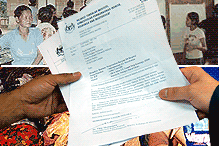BN reps endorsement letters "No Value"

'No value' endorsement letters from BN reps
Andrew Ong- Malaysiakin
The world came crashing down on S Subramaniam, 45 and unemployed, when he was diagnosed with a tumour on his right kidney in early June. But he saw a glimmer of hope when friends told him that MIC leaders gave financial aid to worthy cases.
After seeking advice from the MIC headquarters, he headed for the office of party deputy president G Palanivel who is also women and family development minister which oversees the Welfare Department. That was when he met Palanivel’s private secretary, Dr Vijay Shanmugam, who listened to his plight and subsequently issued a letter of appeal to the hospital concerned to waive Subramaniam’s medical bills which was about RM2,000.
“Dr Vijay told me that I needn’t worry, as the letter would settle everything,” said Subramaniam (right), a former lorry driver. Back at the hospital, Subramaniam was met with a rude shock when admissions staff refused to entertain the letter and demanded a RM1,000 deposit for his treatment, despite his repeated pleas.
“I was told that the MIC issue these letters all the time and that they were tidak laku (worthless),” he said, adding that he spent the whole day at the hospital as he was given the run-around to meet various admission department officers.
Given run-around
“I have a tumour in my kidney and doctors said it would leak anytime. But eventually, they sent me away. I was humiliated and embarrassed. If it wasn’t for that letter and assurance that I don’t have to foot the bill, I would have found ways to finance the operation,” he added.
Eventually, Subramaniam sought a guarantee letter from the Employees Provident Fund which agreed to release enough funds for his medical bills and had the kidney removed on Aug 3.
But this was not before having sought Vijay's help again, who issued another letter, this time urging the Hulu Langat Social Welfare Department to provide supporting documents for the medical bill waiver. Even the department’s letters, was met with the same response from the hospital, said Subramaniam.
“If government institutions, such as hospitals, do not accept these letters, why is the deputy minister’s office issuing them? They have done me more harm than good,” said an upset Subramaniam, who had to travel from Semenyih to Kuala Lumpur frequently by public transport during the three-month ordeal.
Repeated attempts yesterday and today to contact Vijay at his office were futile.
Placebo effect
Two opposition leaders known for their grassroots activities said such letters often give false hope to the lesser informed members of society.
Parti Keadilan Rakyat (PKR) vice youth chief S Manikavasagam said Subramaniam’s cases was not isolated as he has in possession plenty of ‘endorsement letters’ signed by top MIC leaders which did not solve anything. “Take for example the letters by (MIC president) Samy Vellu which asked local authorities to stop demolition of Hindu temple. Not even one worked,” he said. Other problems which commonly lead to individuals seeking such letters from elected representatives include scholarship applications, eviction of squatters, welfare and medical benefits.
Democratic Action Party NGO bureau chief Ronnie Liu believes that a system exits which allows Barisan Nasional elected representatives to gain undue credit through issuing such letters. For example, he said many squatters in the Petaling Jaya area facing eviction had sought endorsement letters from elected representatives thinking that it would help them secure rights to low-cost accommodation, when it was actually based on merit and that the letters carry no weight.
“Likewise, genuine cases get discounts at the hospital. It’s a matter of procedure. But those with such letters thinks they work!” said Liu, adding that even the Menteri Besar’s endorsement letter did not help Ulu Yam villagers in their protracted land tussle.
Letters sometimes crucial
Meanwhile, Subang Jaya state assemblyperson of Lee Hwa Beng told malaysiakini that he is normally very reluctant to issue such letters. “In most cases it is a waste of time. If my constituents have a problem, I would try to help them by facilitating a meeting with the (government) agency concerned,” said Lee, who is also a MCA central committee member.
He said issues such as squatter problems for example, must usually be dealt with at the Menteri Besar’s level, but there are cases whereby endorsement letters from elected representatives were crucial. These include application for hawker, lorry and bus licenses from elected representatives in his area, application for citizenship and in certain cases, letters to endorse a student’s wish to be transferred to specific school.
“But if they still want a letter, we would issue one as it is better than nothing. But one must make sure he is sincere in giving them,” said Lee.
Puchong Parliamentarian Lau Yeng Peng said an endorsement letter should not be treated as a solution to one’s problems. “I've explained to people who see me that if they are genuine cases, I will lend my support. But they must also understand that the other party has the right to consider and even reject the letter,” said Lau, when told about Subramaniam’s allegations.
Helping delivery system
Deputy Minister in the Prime Minister Department M Kayveas, who is also Taiping MP, explained that without proper vetting of the applicant, such letters have no value.
“In most cases, I meet them first and not through their agent,” he said, adding that in the past, some unscrupulous individuals acted as agents for others to obtain such letters in return for a fee. He said such letters help in many areas such as job recommendation, reducing hospital bills and matters involving the customs, immigration departments and the local authorities.
He explained that this was a way to help the government’s delivery system, as at times, technical problems might stall a person’s request from a particular agency.
“The good part of it is that the letters get a 99.9 percent positive response. They (recipients) really appreciate that I have personally vetted the applicant (for the letter) as a deputy minister and a party leader,” added Kayveas.


0 Comments:
Post a Comment
<< Home